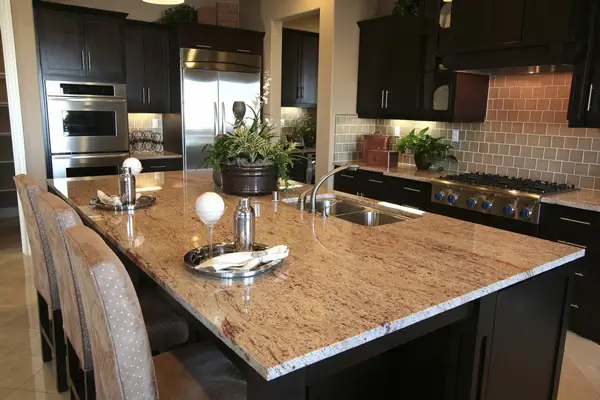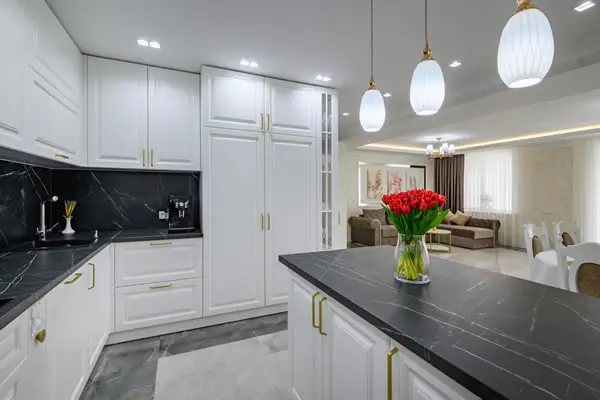Choosing the Best Countertop Material: Pros and Cons of Popular Options
When it comes to designing or remodeling a kitchen or bathroom, countertops play a major role in both aesthetics and functionality. From natural stone to engineered surfaces, there are several materials to choose from—each with its own set of advantages and drawbacks. Here’s a breakdown of the most popular countertop materials to help you decide which one suits your style, budget, and lifestyle best.

-
Granite Countertops
Pros:
- Durable and heat-resistant
- Unique natural patterns and colors
- Adds resale value to homes
- Scratch-resistant
Cons:
- Requires periodic sealing to prevent stains
- Can be expensive
- Heavy, requires sturdy cabinetry
Best For: Homeowners who want a high-end, natural look with long-term durability.
-
Quartz (Engineered Stone)
Pros:
- Extremely durable and non-porous
- Low maintenance – no sealing required
- Available in a wide range of colors and patterns
- Resists stains and bacteria
Cons:
- Not as heat-resistant as granite or stone
- Can be costly
- May not appeal to purists who prefer natural stone
Best For: Busy households or those who want beauty with minimal upkeep.
-
Marble Countertops
Pros:
- Luxurious, elegant appearance
- Naturally cool surface, great for baking
- Each slab is one-of-a-kind
Cons:
- Soft and porous – prone to staining and scratching
- Requires regular sealing and maintenance
- Expensive
Best For: Low-traffic kitchens or bathrooms where visual appeal is a priority.
- Butcher Block (Wood)
Pros:
- Warm, natural look
- Can be sanded and refinished
- Budget-friendly compared to stone
Cons:
- Easily scratched and dented
- Requires regular oiling and sealing
- Not heat- or moisture-resistant
Best For: Cozy or rustic-style kitchens; people who enjoy the character of natural wood aging.
- Laminate Countertops
Pros:
- Very affordable
- Easy to install and available in many colors and patterns
- Low maintenance
Cons:
- Less durable – can scratch, chip, or burn easily
- Not suitable for high-end designs
- Difficult to repair
Best For: Budget-conscious homeowners, rentals, or light-use areas.
-
Concrete Countertops
Pros:
- Customizable shape and color
- Modern, industrial aesthetic
- Very strong and durable
Cons:
- Requires sealing and may develop hairline cracks
- Can be prone to staining
- Heavy and may be costly due to customization
Best For: Contemporary kitchens or those seeking a one-of-a-kind, artisanal look.
-
Solid Surface (e.g., Corian)
Pros:
- Seamless installation
- Resistant to stains and bacteria
- Easy to repair minor damage
Cons:
- Can be damaged by heat or scratches
- Looks less natural than stone
- Mid-to-high price range
Best For: Those who want a sleek, uniform surface that’s easy to clean.
-
Soapstone Countertops
Pros:
- Resistant to heat and stains
- Smooth, soft feel with a timeless look
- Develops a natural patina over time
Cons:
- Can scratch or dent more easily than granite
- Limited color options (mostly gray or black)
- Requires occasional oiling
Best For: Historic or traditional homes where a classic, weathered aesthetic is desired.

Final Thoughts: Which Countertop Is Best?
The “best” countertop really depends on your lifestyle and priorities:
- For durability and low maintenance: Quartz
- For natural luxury: Granite or Marble
- For warmth and affordability: Butcher Block or Laminate
- For modern design and uniqueness: Concrete or Soapstone
When selecting a countertop, consider how much traffic your kitchen gets, how often you cook, and whether aesthetics or practicality matters more. A professional consultation can also help match your material of choice with your home’s overall design and structural needs.


